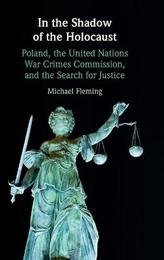
|
In the Shadow of the Holocaust: Poland, the United Nations War Crimes Commission, and the Search for Justice
Hardback
Main Details
| Title |
In the Shadow of the Holocaust: Poland, the United Nations War Crimes Commission, and the Search for Justice
|
| Authors and Contributors |
By (author) Michael Fleming
|
| Physical Properties |
| Format:Hardback | | Pages:350 | | Dimensions(mm): Height 235,Width 157 |
|
| Category/Genre | The Holocaust |
|---|
| ISBN/Barcode |
9781009098984
|
| Classifications | Dewey:940.53438 |
|---|
| Audience | | Tertiary Education (US: College) | |
|---|
| Illustrations |
Worked examples or Exercises; Worked examples or Exercises
|
|
Publishing Details |
| Publisher |
Cambridge University Press
|
| Imprint |
Cambridge University Press
|
| Publication Date |
6 January 2022 |
| Publication Country |
United Kingdom
|
Description
In the midst of the Second World War, the Allies acknowledged Germany's ongoing programme of extermination. In the Shadow of the Holocaust examines the struggle to attain post-war justice and prosecution. Focusing on Poland's engagement with the United Nations War Crimes Commission, it analyses the different ways that the Polish Government in Exile (based in London from 1940) agitated for an Allied response to German atrocities. Michael Fleming shows that jurists associated with the Government in Exile made significant contributions to legal debates on war crimes and, along with others, paid attention to German crimes against Jews. By exploring the relationship between the UNWCC and the Polish War Crimes Office under the authority of the Polish Government in Exile and later, from the summer of 1945, the Polish Government in Warsaw, Fleming provides a new lens through which to examine the early stages of the Cold War.
Author Biography
Michael Fleming is a historian based in London. His publications include Communism, Nationalism and Ethnicity in Poland, 1944-1950 (2010), Auschwitz, the Allies and Censorship of the Holocaust (2014) and, as editor, Essays Commemorating Szmul Zygielbojm (2018). He is a recipient of the Kulczycki Book Prize for Polish Studies, and the Aquila Polonica Prize.
Reviews'At a time when the Polish government seems intent on seizing the property of long-dead Jews, Michael Fleming's book provides vital fresh insights - challenging the idea of universal hostility of Christian Poles for the Jewish countryfolk. Using long secret archives of Polish efforts to get Nazis into court for the Holocaust, Fleming has constructed a factual account as gripping as any from Ian Fleming, his spy-fiction writing namesake.' Dan Plesch, author of Human Rights After Hitler 'This pathbreaking book sheds important new light on post-war attempts to prosecute Nazi war criminals and collaborators through an analysis of the participation in the United Nations' War Crimes Commission of representatives of the Polish government, first that established in the west after the Polish defeat and then by the pro-communist government established by the Soviets. It is essential reading for all those interested in the problem of how to prosecute genocide and crimes against humanity.' Antony Polonsky, Emeritus Professor of Holocaust Studies, Brandeis University 'Of the forty-seven members of my immediate family, only three women and I survived the Holocaust. I read Michael Fleming's new work first and foremost as a historian, but I cannot completely free myself from emotion. Information about the fate of hundreds of thousands of families like mine reached Western public opinion during the war with difficulty, with resistance and... with brakes. Michael Fleming wrote about this in his excellent work Auschwitz, the Allies and Censorship of the Holocaust. In the latest book, we have a kind of follow-up: how a "minor" Ally, but the first to offer armed resistance to German fascism - Poland - tried to sensitise the Allies to the problem of criminal responsibility for the crime of genocide and the Holocaust. And it is no coincidence that this "minor" Ally produced outstanding lawyers who had something new to say in this area. Michael Fleming's In the Shadow of the Holocaust is not only an insightful study of the past, it is also a warning against - God forbid - a repetition in the future.' Marian Turski, President of the International Auschwitz Committee
|